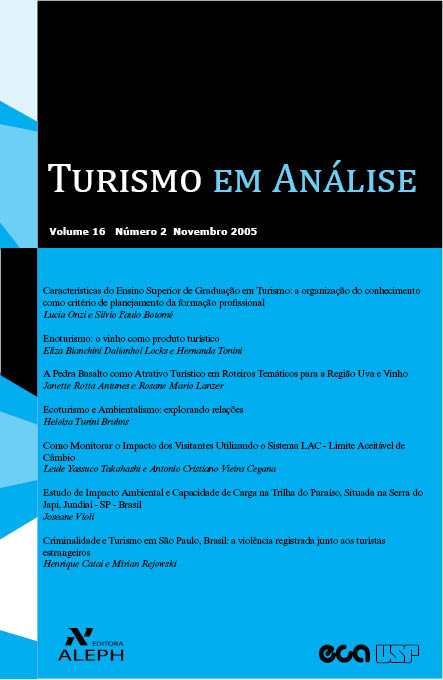Environmental impacts and carrying capacity: a study of the Paradise Trail, situated in Serra do Japi, Jundiaí - SP - Brazil
DOI:
https://doi.org/10.11606/issn.1984-4867.v16i2p223-243Keywords:
ecotourism, environmental impact, trail, carrying capacity, Serra do Japi.Abstract
The ecotourism appeared as a desire to usufruct the landscape, followed for the concern and awareness with the environment, and aims responsibility with sustainment, the education of the visitor through the interpretation of the nature, and the benefits to the local communities. To prevent the protecting areas of environmental impacts, it is necessary to have a plan for the place with the objective to reach a sustainable development for the natural patrimony. An analysis of the landscape will be carried through, where the environmental impact caused by the visitation in the trail of the Paradise will be verified, carrying through study of load capacity with the intention to establish a limit to the use of such trail, so that this does not result in environmental deterioration. For this research, had been selected the methods of Bruschi et ai, Magro and Cifuentes.Downloads
Download data is not yet available.
Downloads
Published
2005-11-30
Issue
Section
Articles
License
Authors retain the copyright and grant the journal the right of first publication, with the work simultaneously licensed under the Creative Commons Attribution-NonCommercial-ShareAlike 4.0 International (CC BY-NC-SA 4.0), allowing the sharing of the work with recognition of its authorship and initial publication in RTA.
How to Cite
VIOLI, Jaseane. Environmental impacts and carrying capacity: a study of the Paradise Trail, situated in Serra do Japi, Jundiaí - SP - Brazil. Revista Turismo em Análise, São Paulo, Brasil, v. 16, n. 2, p. 223–243, 2005. DOI: 10.11606/issn.1984-4867.v16i2p223-243. Disponível em: https://revistas.usp.br/rta/article/view/63738.. Acesso em: 26 jul. 2024.











